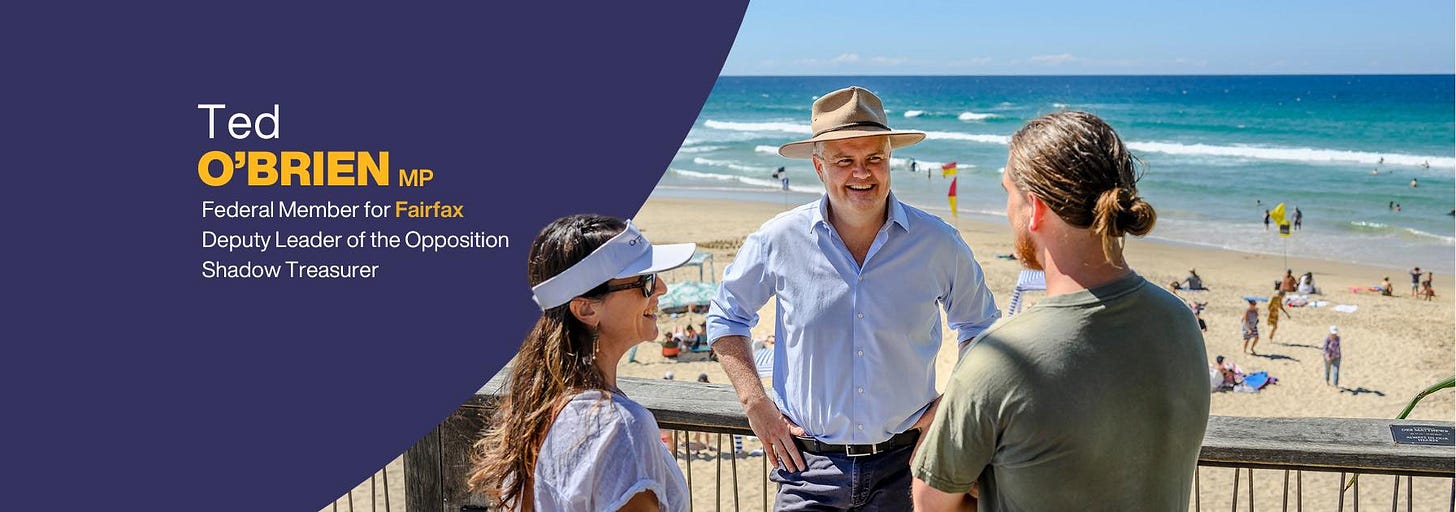Opposition Opens Door to Environment Authority in Economic Roundtable Talks
Today’s email is brought to you by Empower your podcasting vision with a suite of creative solutions at your fingertips.
Shadow Treasurer Ted O'Brien signaled Wednesday that the Coalition is open to supporting a federal Environment Protection Authority, marking a potential breakthrough in the government's stalled environmental reform agenda during ongoing economic productivity discussions.
Speaking during the second day of the Albanese government's three-day economic roundtable, O'Brien indicated the opposition would take a constructive approach to environmental law reforms that have previously faced Coalition resistance.
"We are absolutely willing to be as constructive as we can," O'Brien told ABC News. "So if we can work together, let's work together. We're not saying [an EPA is] a red line at all."
The comments represent a significant shift from the Coalition's previous stance, which blocked similar environmental protection legislation during Labor's first term. The roundtable brings together government ministers, opposition members, business leaders and union representatives to address Australia's productivity challenges.
O'Brien emphasized the opposition's willingness to collaborate while maintaining some conditions.
"We'll be open, constructive where we can, critical where we must," he said.
Truth matters. Quality journalism costs.
Your subscription to Mencari directly funds the investigative reporting our democracy needs. For less than a coffee per week, you enable our journalists to uncover stories that powerful interests would rather keep hidden. There is no corporate influence involved. No compromises. Just honest journalism when we need it most.
Not ready to be paid subscribe, but appreciate the newsletter ? Grab us a beer or snag the exclusive ad spot at the top of next week's newsletter.
The Shadow Treasurer's comments came as participants identified regulation reduction as a key priority, with broad agreement that Australia faces excessive regulatory burden. O'Brien said the previous government implemented approximately 5,000 additional regulations during its term.
"We're way too regulated in this country," O'Brien said. "There needs to be fewer and better regulations, but there needs to be specific time-bound targets on the government to deliver."
Housing supply emerged as another area of consensus, with participants agreeing that supply constraints represent the primary challenge in addressing Australia's housing affordability crisis. The government's target of 1.2 million new homes faces significant delivery challenges.
"Where there's agreement in the room, it's the key challenge being supply, supply, supply," O'Brien said.
Discussions included potential solutions such as freezing the National Construction Code, which aligns with Coalition election policy, and reforming environmental approval processes to accelerate development.
However, energy policy proved more contentious, with O'Brien criticizing the government's approach to renewable energy transition.
"I believe that they are defining the wrong problem to solve," O'Brien said. "All the discussion is, the problem to solve is we need to achieve 82% renewables on the grid. It's all about how do we accelerate the rollout of the existing energy plan."
O'Brien argued the focus should shift toward delivering cheaper electricity rather than accelerating renewable energy deployment, citing rising energy costs affecting households and businesses.
"The discussion at the table should, in fact, be trying to answer a different question, which is what is the cheapest electricity grid that we can deliver to households and to families," he said.
The Shadow Treasurer warned that policies making Australia more expensive for business would undermine productivity improvements.
"If we are talking about skewing approvals, or to deliver, accelerate the delivery of an energy plan, which is making Australia more expensive to do business in, that doesn't solve for living standards. It makes it worse, not better," he said.
ACTU Secretary Sally McManus offered a different perspective, describing herself as feeling "outnumbered" on certain proposals while expressing satisfaction with overall discussions.
"I have to say sometimes we feel a bit outnumbered on those matters," McManus told ABC News, referring to business-focused discussions. "Obviously there's a lot of business representatives there."
McManus highlighted union proposals including a training levy for large businesses, artificial intelligence regulation and various tax reforms. The training levy proposal faced resistance from business representatives.
"I wouldn't say that it had a lot of fans amongst business," McManus said of the training levy, which would require companies to invest in worker training or pay equivalent amounts to government programs.
The union leader defended the proposal as addressing productivity challenges caused by insufficient business investment in worker skills.
"The big businesses in our country, there's like so many monopolies effectively and duopolies. They're making really good profits. And instead of investing it on the things that make a difference for productivity, like capital, like better equipment or about training, they've been taking it in like shareholder buyouts or dividends," McManus said.
On artificial intelligence regulation, McManus advocated for comprehensive legislation to manage AI implementation, contrasting her approach with what she characterized as a "let rip" philosophy.
"There's one view of the world, let's call it the Trump view of the world, and that's that if you do that, AI will be used by authoritarian governments, it will increase inequality," McManus said.
She argued for upfront regulation to build public trust and ensure workers benefit from AI productivity gains.
"The essential thing is trust, right? Like, people have got to trust AI in order for it to deliver good outcomes," McManus said.
Despite disagreements on specific policies, McManus noted broad consensus on addressing intergenerational inequality, particularly housing affordability.
"The biggest thing that people agree on is the need to address intergenerational inequality and this is said from all these different voices," she said. "If we're all coming, well, 90% of us are coming from a position that we want to see the next generation be better off, not worse off, it's a very good starting point."
The roundtable discussions continue Thursday, with tax policy expected to feature prominently. Prime Minister Anthony Albanese has indicated the government will not implement tax changes beyond those taken to the last election.
O'Brien also signaled potential Coalition support for road user charges, addressing the revenue gap created by increasing electric vehicle adoption.
"Everybody who drives on the roads, well, they should be responsible for contributing to the upkeep of those roads, including people who drive EVs," he said. "So as a basic principle, you use the roads, well, you should make a contribution."
The roundtable represents the government's attempt to build bipartisan consensus on productivity reforms after facing criticism for slow economic growth and declining living standards. Participants described generally positive discussions despite policy disagreements.
The talks address critical challenges including housing supply, regulatory burden, energy policy and workplace relations as Australia grapples with productivity growth that has lagged international comparisons.
Business leaders, union representatives and government officials continue discussions Thursday before concluding the three-day summit with potential policy recommendations for addressing Australia's economic challenges.
Got a News Tip?
Contact our editor via Proton Mail encrypted, X Direct Message, LinkedIn, or email. You can securely message him on Signal by using his username, Miko Santos.
Sustaining Mencari Requires Your Support
Independent journalism costs money. Help us continue delivering in-depth investigations and unfiltered commentary on the world's real stories. Your financial contribution enables thorough investigative work and thoughtful analysis, all supported by a dedicated community committed to accuracy and transparency.
Subscribe today to unlock our full archive of investigative reporting and fearless analysis. Subscribing to independent media outlets represents more than just information consumption—it embodies a commitment to factual reporting.
As well as knowing you’re keeping Mencari (Australia) alive, you’ll also get:
Get breaking news AS IT HAPPENS - Gain instant access to our real-time coverage and analysis when major stories break, keeping you ahead of the curve
Unlock our COMPLETE content library - Enjoy unlimited access to every newsletter, podcast episode, and exclusive archive—all seamlessly available in your favorite podcast apps.
Join the conversation that matters - Be part of our vibrant community with full commenting privileges on all content, directly supporting The Evening Post (Australia)
Catch up on some of Mencari’s recent stories:

Shadow Minister Claims Australia-Israel Relations Hit "All-Time Low" Due to Government Incompetence
It only takes a minute to help us investigate fearlessly and expose lies and wrongdoing to hold power accountable. Thanks!






